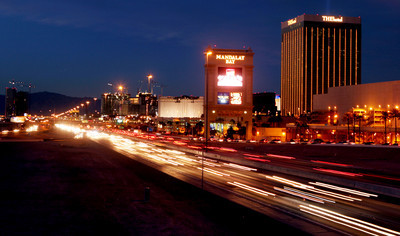Toll lane plan for Las Vegas would allow private funding

Transportation officials are expected to press the Legislature this session with their plan to allow 19 miles of toll lanes to be built on Las Vegas freeways and funded by more than $1 billion of private money, a concept that currently is not allowed under Nevada law.
Since dying in the 2007 session, the toll lane concept has gained some momentum in Nevada. It is viewed by transportation officials as a cure for lower projected tax revenues.
Sen. Dennis Nolan, R-Las Vegas, a toll lane advocate, said modern-day toll lanes allow roads to be built and congestion reduced at little cost to the government by using private funding and advanced technology.
But toll lanes are not widely accepted or well understood partly because of technological inadequacies in antiquated toll systems.
That debate will be at the forefront of transportation issues argued during the state legislative session beginning today. Other issues will include possible changes to laws concerning seat belts and scooters and mopeds, electronic or photographic enforcement at intersections, a possible cell phone ban, and using private advertising dollars to pay for maintenance of intersections.
In Nevada, the toll lane plan must overcome two major obstacles: Tolls and electronic enforcement are not allowed under state law, and the project must rely on both to be effective.
A demonstration project would stretch toll lanes from U.S. Highway 95 near Ann Road to Interstate 15 and connect using flyover lanes to I-15 south to Interstate 215 so users could avoid onramps and off-ramps at the Spaghetti Bowl.
There would be no fee for emergency vehicles, transit buses and cars with three or more passengers to use the toll lanes. A fee would be charged for vehicles with one or two persons. State officials have speculated the fee could be as little as 10 cents per mile during off-peak travel times and as much as $1 per mile during peak travel times.
There would be no toll booths. Drivers would be issued a transponder card that would be read using radio waves. Cameras would photograph license plates of vehicles without a transponder.
It’s unclear whether there is enough support in the Legislature for the demonstration project to pass.
Scott Rawlins, deputy director of the Nevada Department of Transportation, said the bill will be presented so that toll lanes and electronic enforcement would be made legal only for this project.
With state revenues falling, legislators must look for creative solutions to battle congestion on Nevada roads, said Nolan, a member of the state senate’s Energy, Infrastructure and Transportation Committee.
Transportation Department chief Susan Martinovich said a strong lobbying effort will be made to educate legislators about new technologies available for toll lanes.
Meanwhile, Martinovich is presenting a $1.2 billion budget for the Transportation Department to the legislature for fiscal years 2010 and 2011.
The department receives its funding from the state highway fund, made up from revenues that include the state fuel tax. Martinovich said revenues have been down recently so the budget is “really pretty lean for us.”
It includes more than $750 million for capital improvement projects over the two-year period.
That doesn’t come close to covering the more than $8 billion in projects on the department’s wish list, which includes widening Interstate 15 from California to Las Vegas, improving interchanges along the Las Vegas Beltway and widening U.S. 95 in the northwest valley.
Hoping to find other forms of revenue, Martinovich is promoting a plan in the Legislature to have private companies maintain and enhance freeway interchanges in exchange for advertising at the interchanges.
In the meantime, state law enforcement agencies and traffic safety advocates again will push for making failure to wear a seat belt a primary offense. It is now a secondary offense, which means drivers cannot be pulled over for failing to wear a seat belt.
Nolan said public opinion polls have shown support for the law. Nolan explained that for every fatal vehicle wreck, there is a heavy burden on taxpayers when considering the cost of police, fire and medical personnel and private contractors such as tow trucks and morticians.
The North Las Vegas Police Department probably will present its recent study of red-light cameras, meant to electronically ticket drivers who run red lights.
Nolan, who has studied the idea and supports it, said the results of such cameras in cities such as Phoenix show a drop in crashes and injuries at intersections that employ electronic enforcement.
Legislation to ban using a hand-held cell phone while driving might be introduced, but probably won’t garner enough support to pass, Nolan said.
Also, law enforcement agencies are pushing for an upgrade to scooter and moped laws in Nevada. Police want to bring scooters and mopeds under the same laws governing motorcycles, including making riders wear helmets.
Contact reporter Francis McCabe at fmccabe @reviewjournal.com or 702-387-2904.